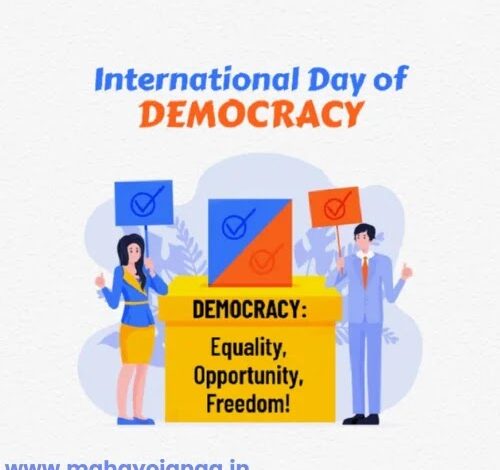International Day of Democracy 2025: Celebrating the Pillars of Freedom and Participation

On September 15, 2025, the world will come together to commemorate the International Day of Democracy, a global observance established by the United Nations General Assembly in 2007 to promote and uphold the principles of democracy. This day serves as a reminder of the importance of democratic governance, citizen participation, and the protection of fundamental freedoms in fostering peace, development, and human rights. As we reflect on the significance of this day in 2025, it is an opportunity to evaluate the state of democracy worldwide, celebrate its achievements, address its challenges, and envision a future where democratic values thrive in an increasingly complex global landscape.
{tocify} $title={Table of Contents}
The Essence of Democracy
Democracy, derived from the Greek words demos (people) and kratos (rule), is fundamentally about the power of the people to govern themselves. It is a system that ensures individuals have a voice in decisions that affect their lives, whether through direct participation or elected representatives. At its core, democracy is built on principles such as equality, freedom of expression, rule of law, transparency, and accountability. These values create societies where diverse perspectives coexist, and individuals can exercise their rights without fear of oppression.
 |
| International Day of Democracy |
The International Day of Democracy, observed annually on September 15, was inspired by the Universal Declaration on Democracy adopted by the Inter-Parliamentary Union in 1997. This declaration outlined the essential components of democratic governance, emphasizing free and fair elections, respect for human rights, and the inclusion of all citizens in political processes. In 2025, the theme of the International Day of Democracy, as set by the United Nations, is expected to focus on “Strengthening Democratic Resilience,” a timely call to address the challenges facing democratic institutions in an era of polarization, misinformation, and geopolitical tensions.
The Importance of Democracy in 2025
In 2025, the significance of democracy cannot be overstated. The world is navigating a rapidly changing landscape marked by technological advancements, climate crises, economic inequalities, and social upheavals. Democratic governance provides a framework for addressing these challenges through inclusive dialogue and collective decision-making. By empowering citizens to participate in shaping policies, democracies foster stability and resilience, enabling societies to adapt to new realities while safeguarding individual freedoms.
One of the key strengths of democracy is its ability to promote social cohesion. In diverse societies, democratic institutions provide mechanisms for resolving conflicts peacefully, ensuring that minority voices are heard, and fostering a sense of shared purpose. Moreover, democracies are better equipped to address global issues such as poverty, inequality, and climate change by encouraging collaboration between governments, civil society, and the private sector. In 2025, as the world grapples with the impacts of climate change, democratic participation will be crucial in ensuring that policies reflect the needs and aspirations of communities most affected by environmental challenges.
Achievements of Democracy
Over the past century, democracy has made remarkable strides. The spread of democratic governance has led to greater political participation, with more countries adopting electoral systems that allow citizens to choose their leaders. Since the end of the Cold War, the number of democracies worldwide has increased significantly, with many nations transitioning from authoritarian regimes to systems that prioritize citizen empowerment. Women, minorities, and marginalized groups have gained greater representation in political processes, thanks to democratic reforms and advocacy for inclusivity.
The advent of technology has also transformed democratic participation. In 2025, digital platforms enable citizens to engage with their governments in unprecedented ways, from online petitions to virtual town halls. Social media has amplified voices that were once marginalized, allowing grassroots movements to influence policy debates. The expansion of access to information has empowered citizens to hold their leaders accountable, fostering transparency and reducing corruption in many democratic systems.
Challenges to Democracy in 2025
Despite these achievements, democracy faces significant challenges in 2025. The rise of authoritarianism, populist movements, and disinformation campaigns threatens the integrity of democratic institutions. In some regions, democratic backsliding has led to the erosion of civil liberties, media freedom, and judicial independence. The spread of misinformation and deepfake technology has undermined trust in electoral processes, making it harder for citizens to distinguish fact from fiction.
Economic inequality is another pressing challenge. In many democracies, wealth disparities have fueled disillusionment with political systems, as citizens feel that their voices are overshadowed by powerful elites. This has given rise to populist movements that exploit public discontent, often promoting divisive narratives that weaken democratic cohesion. Additionally, the climate crisis poses a unique challenge, as governments must balance immediate economic needs with long-term sustainability goals, often under intense public scrutiny.
The digital age, while offering opportunities for participation, also presents risks. Cyberattacks on electoral systems, online harassment of activists, and the manipulation of social media algorithms threaten the democratic process. In 2025, ensuring the security and integrity of digital platforms will be a critical priority for democratic governments.
Strengthening Democratic Resilience
The theme of “Strengthening Democratic Resilience” for the International Day of Democracy 2025 underscores the need to fortify democratic institutions against these challenges. Resilience requires proactive measures to protect the rule of law, promote inclusive participation, and combat misinformation. Governments, civil society, and international organizations must work together to ensure that democracy remains a vibrant and adaptable system.
One key strategy is enhancing civic education. By equipping citizens with the knowledge and skills to critically evaluate information, democracies can counter the spread of disinformation. Educational initiatives should focus on media literacy, encouraging individuals to verify sources and question narratives. In 2025, governments and organizations can leverage technology to create interactive platforms that educate citizens about their rights and responsibilities in a democratic society.
Another critical area is ensuring inclusive participation. Democracies thrive when all voices are heard, particularly those of marginalized groups such as women, youth, and indigenous communities. In 2025, efforts to increase representation in political processes, whether through quotas, outreach programs, or leadership training, will be essential to building trust in democratic institutions.
Protecting electoral integrity is also paramount. Governments must invest in secure voting systems, transparent campaign financing, and independent electoral commissions to ensure that elections reflect the will of the people. International cooperation can play a role in sharing best practices and providing support to emerging democracies.
The Role of Global Cooperation
The International Day of Democracy 2025 is an opportunity for global cooperation in defending democratic values. The United Nations and regional organizations such as the European Union, African Union, and Organization of American States can facilitate dialogue and provide resources to strengthen democratic governance. By sharing expertise and promoting accountability, these institutions can help countries navigate challenges such as electoral violence, corruption, and human rights abuses.
Civil society organizations also play a vital role. Grassroots movements, advocacy groups, and independent media outlets are essential in holding governments accountable and amplifying citizen voices. In 2025, supporting these organizations through funding, training, and legal protections will be critical to sustaining democratic momentum.
The Path Forward
As we celebrate the International Day of Democracy in 2025, it is a moment to recommit to the principles that underpin free and just societies. Democracy is not a static system; it requires constant nurturing and adaptation to meet the needs of a changing world. By addressing challenges such as disinformation, inequality, and exclusion, and by embracing opportunities for innovation and inclusion, we can ensure that democracy remains a beacon of hope for future generations.
Individuals also have a role to play. Voting, engaging in community discussions, and advocating for transparency are powerful ways to strengthen democracy at the grassroots level. In 2025, citizens around the world can use the International Day of Democracy as a platform to reaffirm their commitment to active participation and civic responsibility.
Conclusion
The International Day of Democracy 2025 is more than a global observance; it is a call to action. In a world facing complex challenges, democracy remains the most effective system for ensuring that all voices are heard and that power is exercised responsibly. By strengthening democratic resilience, promoting inclusivity, and fostering global cooperation, we can build societies that are equitable, sustainable, and free. As we mark this day, let us celebrate the achievements of democracy, confront its challenges with courage, and work together to create a future where every individual has the opportunity to shape their destiny.
FAQ International Day of Democracy 2025
Q. What is the International Day of Democracy?
The International Day of Democracy, observed annually on September 15, is a United Nations initiative established in 2007 to promote and uphold democratic principles like participation, equality, and freedom worldwide.
Q. What is the theme for International Day of Democracy 2025?
The theme for 2025 is expected to be “Strengthening Democratic Resilience,” focusing on fortifying democratic institutions against challenges like misinformation and authoritarianism.
Q. Why is this day important?
It highlights the importance of democratic governance in fostering peace, human rights, and inclusive development, while encouraging citizens to actively participate in shaping their societies.
Q. How can individuals participate in International Day of Democracy 2025?
Individuals can engage by voting, attending community discussions, advocating for transparency, and promoting civic education to strengthen democratic values.
Q. What challenges does democracy face in 2025?
Key challenges include disinformation, electoral interference, economic inequality, and rising authoritarianism, which threaten the integrity and inclusivity of democratic systems.
Source link




